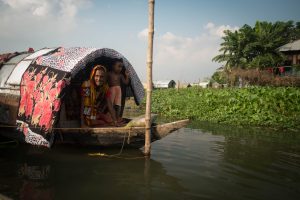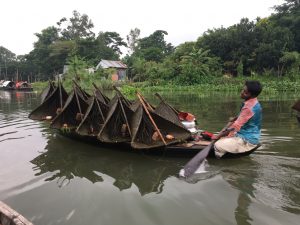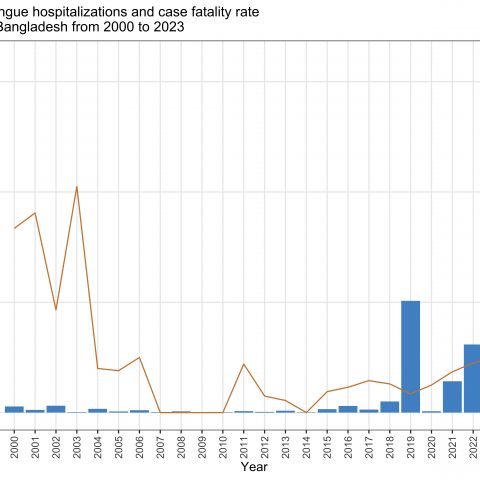Climate change is associated with accelerated global warming, rising sea levels, and increased frequency of natural disasters such as hurricanes and flooding. It is critical to understand the impact of these trends and events on human livelihoods and health as part of ongoing efforts to help affected communities prepare against or adapt to climate change. icddr,b scientists recently contributed to a study on the health and economic impact of a severe flooding in 2017 on a vulnerable fishing community.
The unprecedented rapidity and scale of climate change over past decades has come to threaten the livelihoods of millions of people around the world, especially those living in low-income settings and in coastal and riverine communities that rely on aquatic natural resources for subsistence and survival. While all of Bangladesh — classified as a lower-middle country and situated on a low-lying delta — is highly vulnerable to the effects of climate change, certain communities such as fishers and coastal inhabitants are especially at risk. People identifying with the Shodagor ethnicity live along and near the banks of rivers and canals across Bangladesh. Traditionally a boat-dwelling group, some Shodagor families have more recently moved on to land but continue to rely on fishing and fish trading for subsistence through much of the year.

The study, published in the American Journal of Human Biology, investigated how a September 2017 flood affected some 30 Shodagor families living along the Dhonagoda river, as this flood was different from regular annual flooding and represented a climate change-associated extreme anomaly. Extreme flooding can adversely impact fishing by causing displacement and mortality of fish, especially at earlier life stages. The Shodagor families who were part of the study lived in the Matlab health and demographic study site, and as a result, there was data from before, during, and after the severe flooding event to compare economic and health outcomes.
The authors established that the 2017 flood did adversely impact income from fishing, compared to the months preceding the flooding as well as to the same period in 2018, when there was no severe flood. Interestingly, however, data on kilograms of fish caught revealed that the fishers caught more fish during the flood than they did in the equivalent period in 2018. The fishers suggested that the lower income despite the higher yield during the flood was due to the varieties caught being lower-value and less desirable to consumers. Their economic hardship was further compounded by increased household food expenditures driven by a country-wide inflation likely linked to reduced crop yields from flooding.

To assess the health impact of the flood among the Shodagor families, the authors looked at seasonal changes in body mass starting from the 2017 rainy season to the 2019 dry season. Seasonal change was measured as the difference in body mass between the beginning and end of each season while considering April to October as wet and October to April as dry season. Not only did they observe a decline in body mass during the 2017 rainy season when the flooding occurred, but weight loss continued through the subsequent dry season among children and for a whole year after the flooding among adults. The authors suggest that the weight loss was driven by reduced consumption of non-rice foods as rice prices surged, based on past observations of such behavior like after the 1998 flood in Bangladesh.
Such long-term health impact of a single extreme climate event is especially dangerous in children, who are still developing, The frequency of climate change-associated natural disasters is likely to increase, which will worsen these nutritional insults. It is imperative that international and government relief efforts help buffer vulnerable communities like the Shodagor not only against the direct impact of climate disasters, such as loss of income from fishing, but also indirect effects such as inflation.

